Social Work Self Care Quotes & Sayings
Enjoy reading and share 26 famous quotes about Social Work Self Care with everyone.
Top Social Work Self Care Quotes
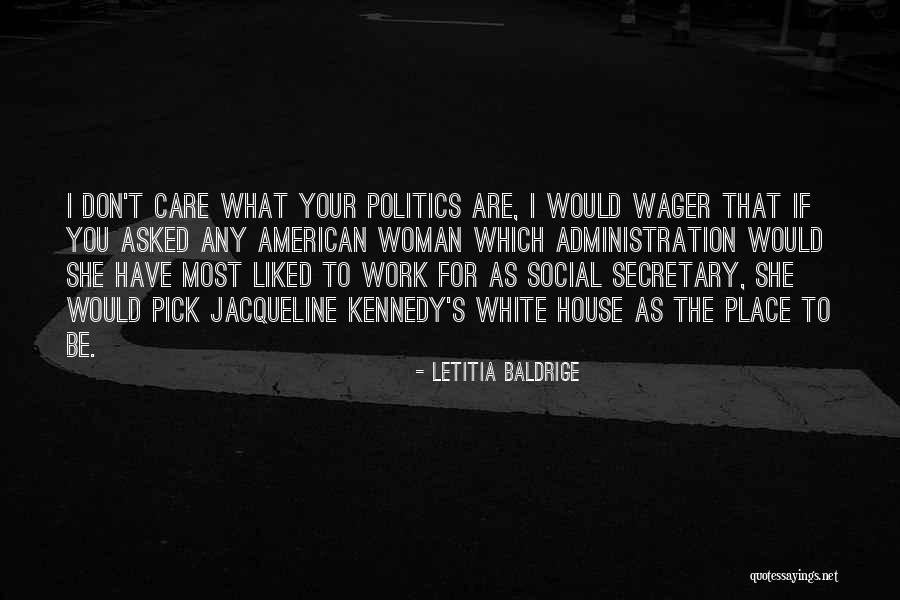
I don't care what your politics are, I would wager that if you asked any American woman which administration would she have most liked to work for as social secretary, she would pick Jacqueline Kennedy's White House as the place to be. — Letitia Baldrige
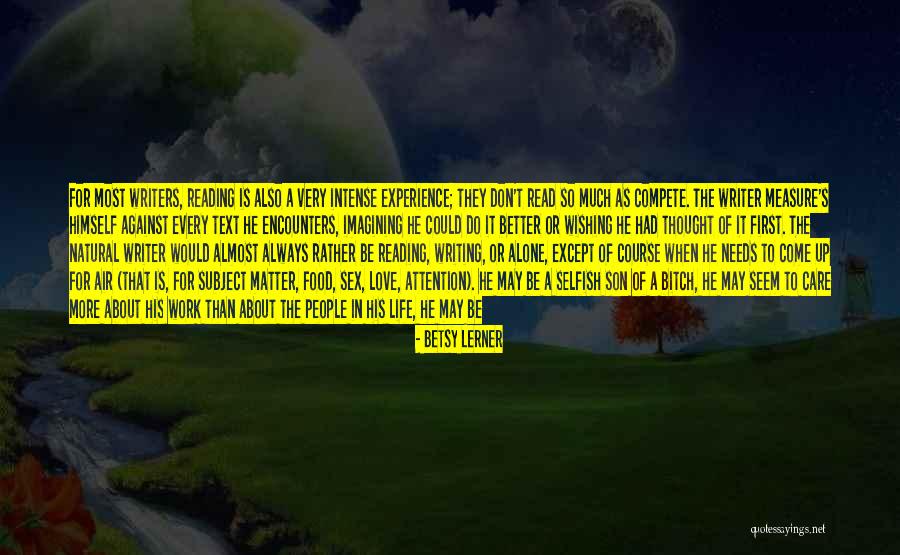
For most writers, reading is also a very intense experience; they don't read so much as compete. The writer measure's himself against every text he encounters, imagining he could do it better or wishing he had thought of it first. The natural writer would almost always rather be reading, writing, or alone, except of course when he needs to come up for air (that is, for subject matter, food, sex, love, attention). He may be a selfish son of a bitch, he may seem to care more about his work than about the people in his life, he may be a social misfit, a freak, or a smooth operator, but every person who does serious time with a keyboard is attempting to translate his version of the world into words so that he might be understood. Indeed, the great paradox of the writer's life is how much time he spends alone trying to connect with other people. — Betsy Lerner
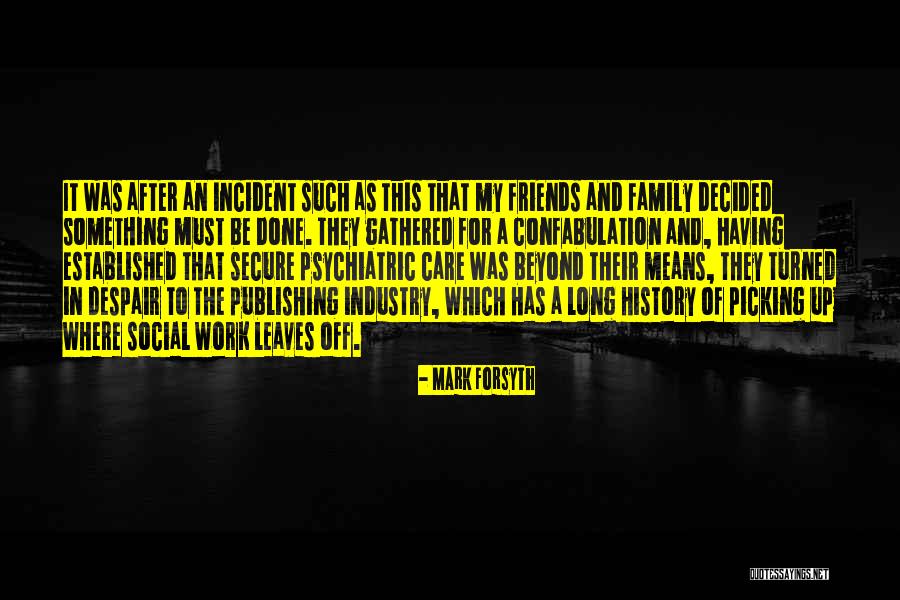
It was after an incident such as this that my friends and family decided something must be done. They gathered for a confabulation and, having established that secure psychiatric care was beyond their means, they turned in despair to the publishing industry, which has a long history of picking up where social work leaves off. — Mark Forsyth
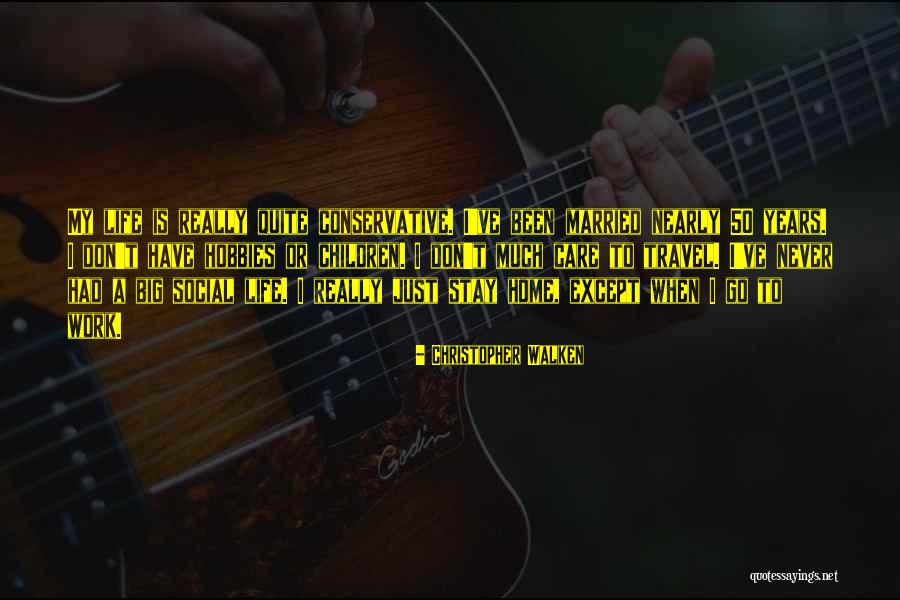
My life is really quite conservative. I've been married nearly 50 years. I don't have hobbies or children. I don't much care to travel. I've never had a big social life. I really just stay home, except when I go to work. — Christopher Walken
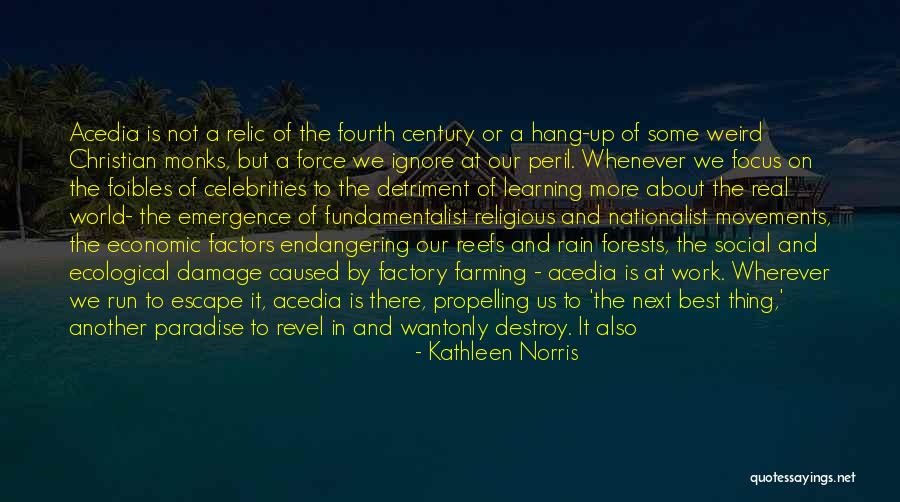
Acedia is not a relic of the fourth century or a hang-up of some weird Christian monks, but a force we ignore at our peril. Whenever we focus on the foibles of celebrities to the detriment of learning more about the real world- the emergence of fundamentalist religious and nationalist movements, the economic factors endangering our reefs and rain forests, the social and ecological damage caused by factory farming - acedia is at work. Wherever we run to escape it, acedia is there, propelling us to 'the next best thing,' another paradise to revel in and wantonly destroy. It also sends us backward, prettying the past with the gloss of nostalgia. Acedia has come so far with us that it easily attached to our hectic and overburdened schedules. We appear to be anything but slothful, yet that is exactly what we are, as we do more and care less, and feel pressured to do still more. — Kathleen Norris
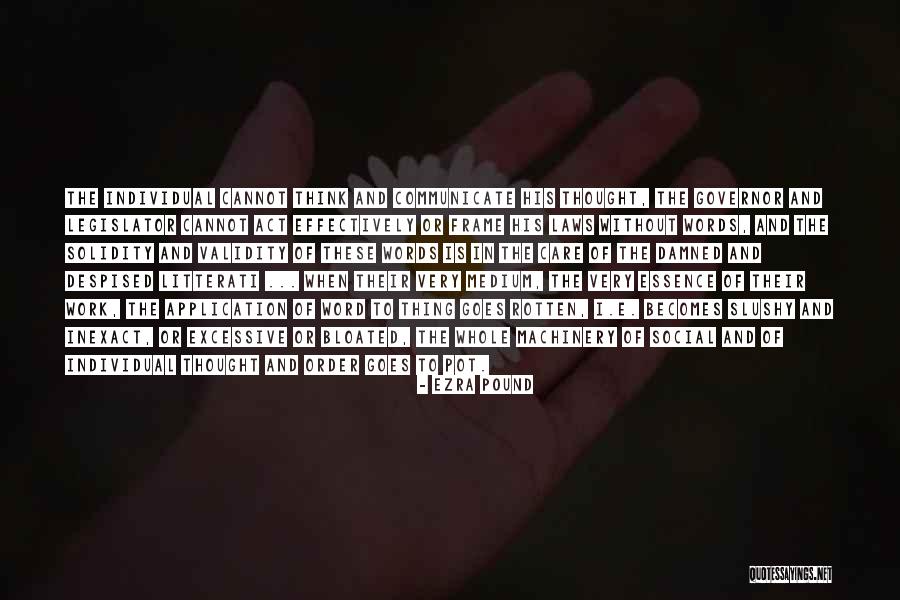
The individual cannot think and communicate his thought, the governor and legislator cannot act effectively or frame his laws without words, and the solidity and validity of these words is in the care of the damned and despised litterati ... when their very medium, the very essence of their work, the application of word to thing goes rotten, i.e. becomes slushy and inexact, or excessive or bloated, the whole machinery of social and of individual thought and order goes to pot. — Ezra Pound
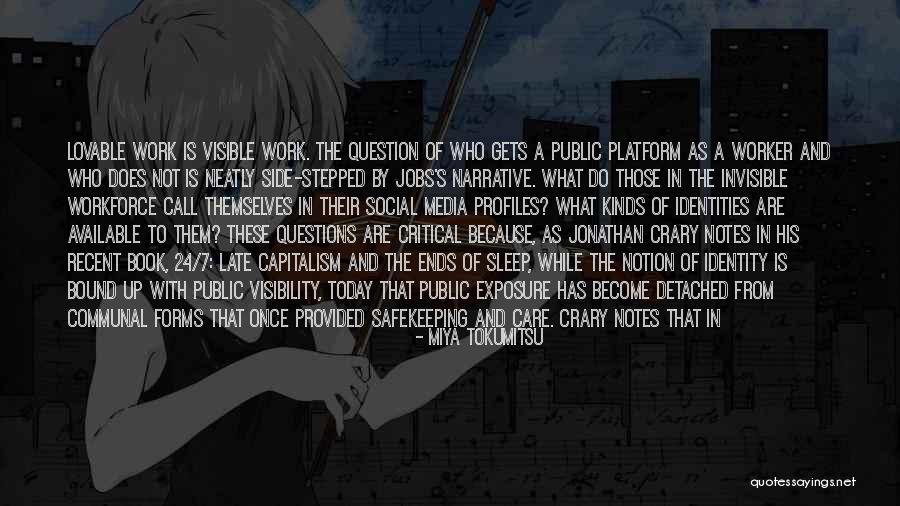
Lovable work is visible work. The question of who gets a public platform as a worker and who does not is neatly side-stepped by Jobs's narrative. What do those in the invisible workforce call themselves in their social media profiles? What kinds of identities are available to them? These questions are critical because, as Jonathan Crary notes in his recent book, 24/7: Late Capitalism and the Ends of Sleep, while the notion of identity is bound up with public visibility, today that public exposure has become detached from communal forms that once provided safekeeping and care. Crary notes that in the always-on, 24/7 temporality in which we now live, the pressure to be constantly consuming or producing necessitates a constant presence in the public sphere, specifically in the marketplace. — Miya Tokumitsu
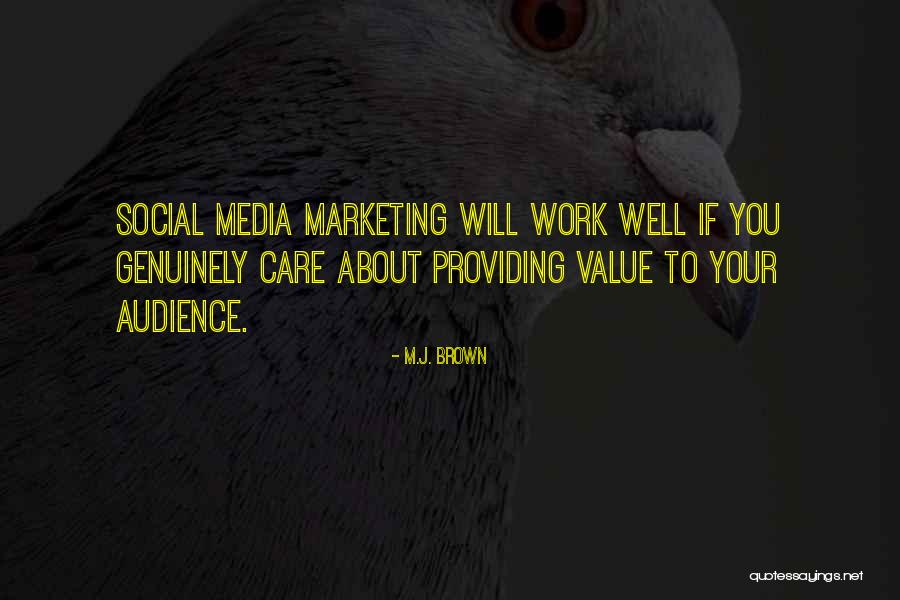
social media marketing will work well if you genuinely care about providing value to your audience. — M.J. Brown
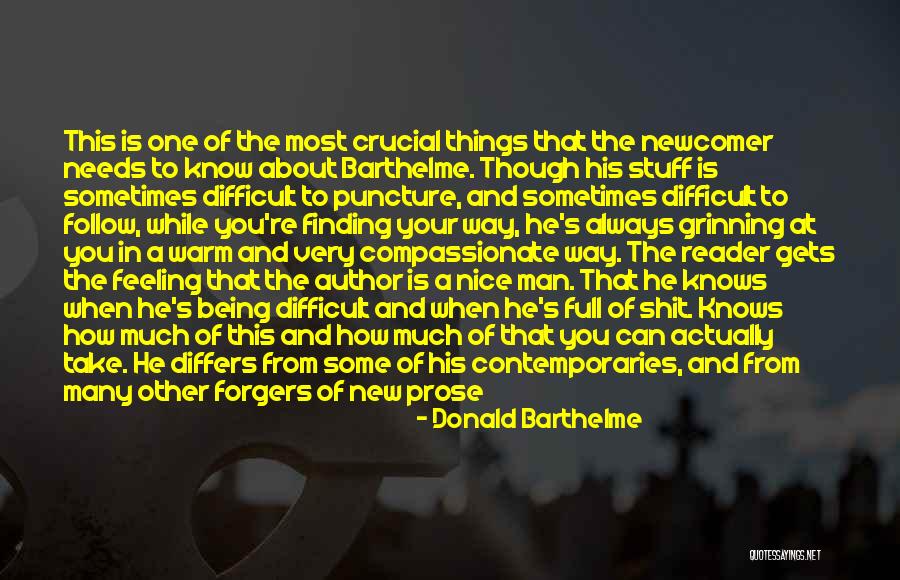
This is one of the most crucial things that the newcomer needs to know about Barthelme. Though his stuff is sometimes difficult to puncture, and sometimes difficult to follow, while you're finding your way, he's always grinning at you in a warm and very compassionate way. The reader gets the feeling that the author is a nice man. That he knows when he's being difficult and when he's full of shit. Knows how much of this and how much of that you can actually take. He differs from some of his contemporaries, and from many other forgers of new prose styles, in that he doesn't ever give off the impression that he takes himself overseriously, and he seems genuinely to care whether or not his work is being read by you. He is a social writer. A writer who seems to be in the next room, waiting for you to finish and tell him what you thought. — Donald Barthelme
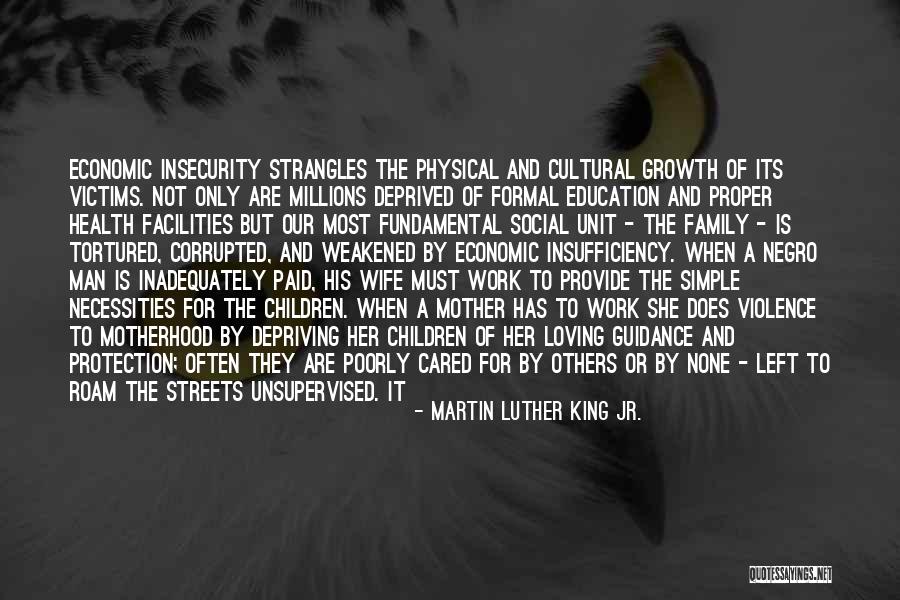
Economic insecurity strangles the physical and cultural growth of its victims. Not only are millions deprived of formal education and proper health facilities but our most fundamental social unit - the family - is tortured, corrupted, and weakened by economic insufficiency. When a Negro man is inadequately paid, his wife must work to provide the simple necessities for the children. When a mother has to work she does violence to motherhood by depriving her children of her loving guidance and protection; often they are poorly cared for by others or by none - left to roam the streets unsupervised. It is not the Negro alone who is wronged by a disrupted society; many white families are in similar straits. The Negro mother leaves home to care for - and be a substitute mother for - white children, while the white mother works. In this strange irony lies the promise of future correction. — Martin Luther King Jr.
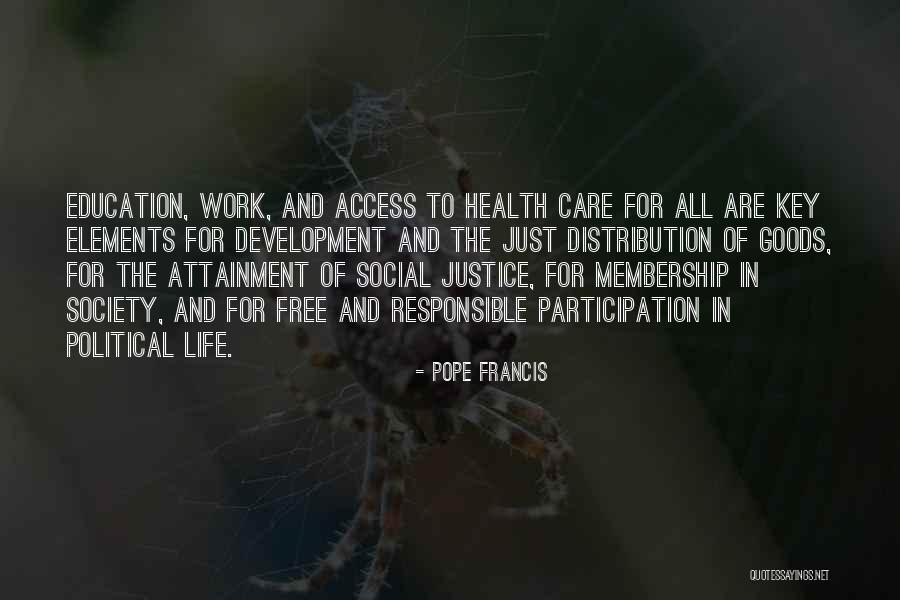
Education, work, and access to health care for all are key elements for development and the just distribution of goods, for the attainment of social justice, for membership in society, and for free and responsible participation in political life. — Pope Francis
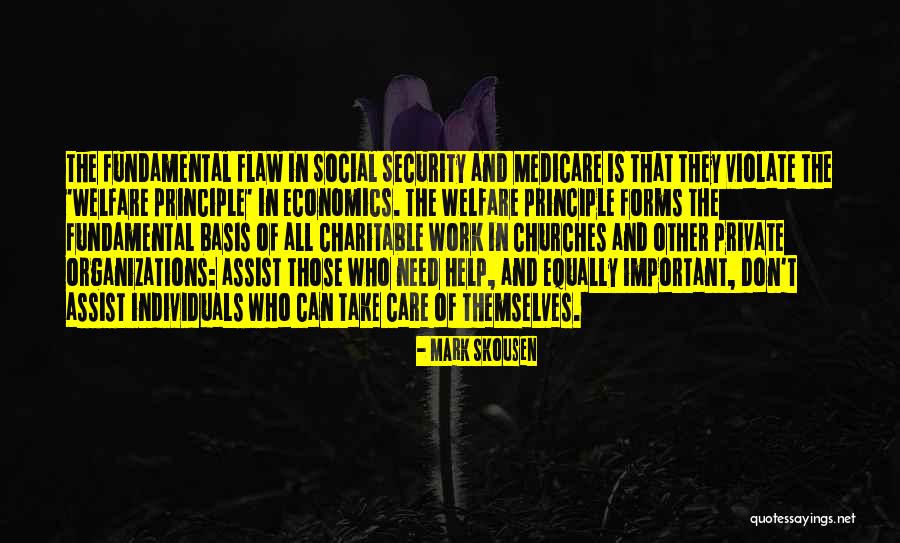
The fundamental flaw in Social Security and Medicare is that they violate the 'welfare principle' in economics. The welfare principle forms the fundamental basis of all charitable work in churches and other private organizations: assist those who need help, and equally important, don't assist individuals who can take care of themselves. — Mark Skousen
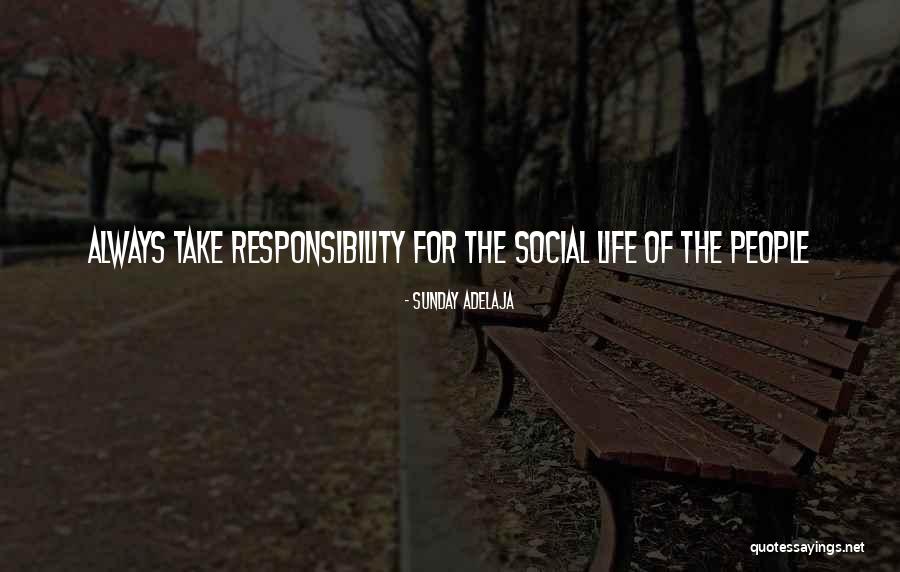
Always take responsibility for the social life of the people — Sunday Adelaja
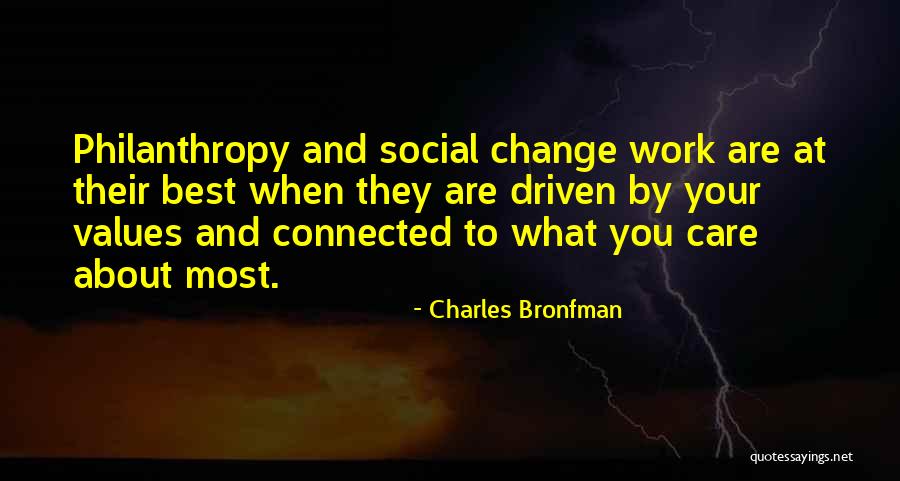
Philanthropy and social change work are at their best when they are driven by your values and connected to what you care about most. — Charles Bronfman
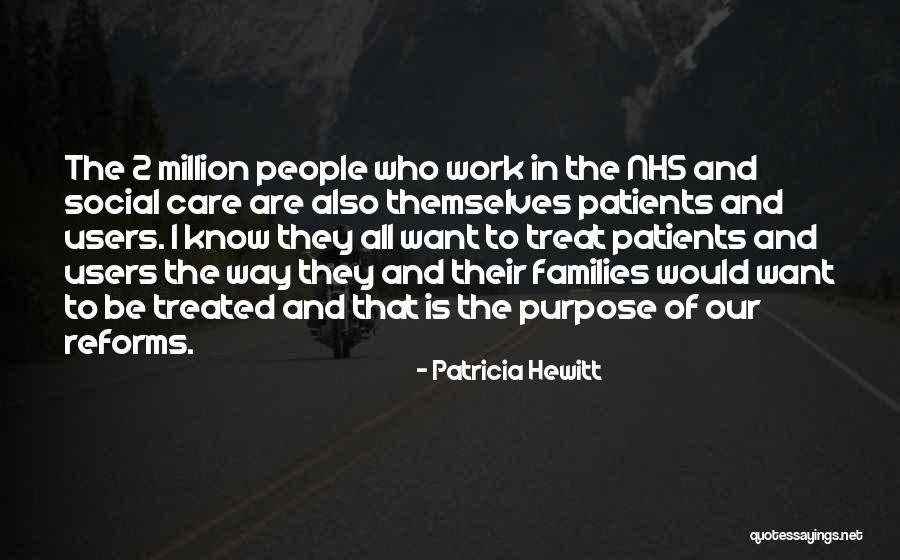
The 2 million people who work in the NHS and social care are also themselves patients and users. I know they all want to treat patients and users the way they and their families would want to be treated and that is the purpose of our reforms. — Patricia Hewitt
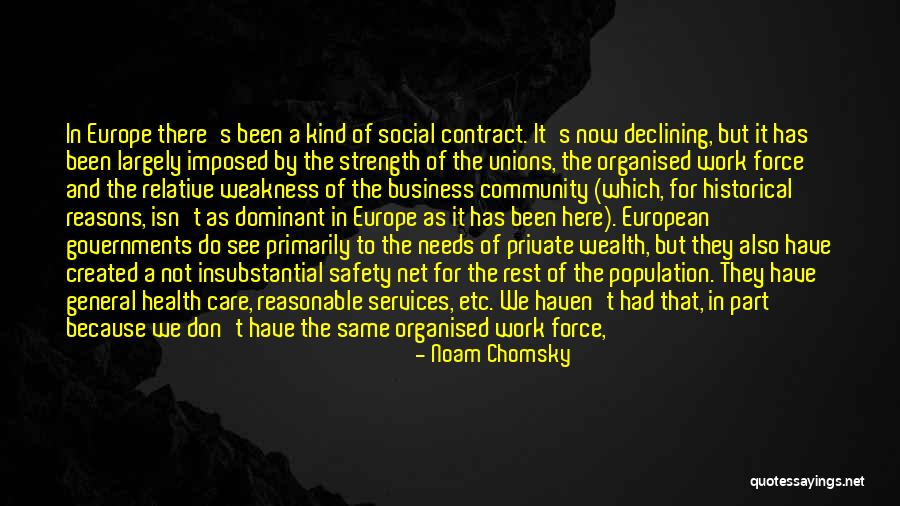
In Europe there's been a kind of social contract. It's now declining, but it has been largely imposed by the strength of the unions, the organised work force and the relative weakness of the business community (which, for historical reasons, isn't as dominant in Europe as it has been here). European governments do see primarily to the needs of private wealth, but they also have created a not insubstantial safety net for the rest of the population. They have general health care, reasonable services, etc. We haven't had that, in part because we don't have the same organised work force, and we have a much more class-conscious and dominant business community. — Noam Chomsky
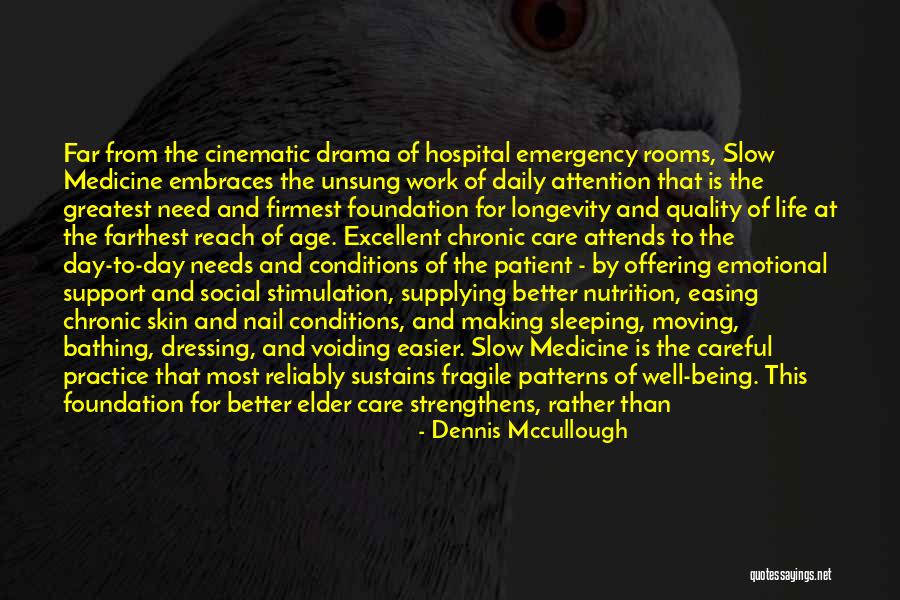
Far from the cinematic drama of hospital emergency rooms, Slow Medicine embraces the unsung work of daily attention that is the greatest need and firmest foundation for longevity and quality of life at the farthest reach of age. Excellent chronic care attends to the day-to-day needs and conditions of the patient - by offering emotional support and social stimulation, supplying better nutrition, easing chronic skin and nail conditions, and making sleeping, moving, bathing, dressing, and voiding easier. Slow Medicine is the careful practice that most reliably sustains fragile patterns of well-being. This foundation for better elder care strengthens, rather than replaces, the selective use of high-tech care. During the time of the writing of this book, I have lived the — Dennis Mccullough

The Constitution charges the president to "take Care that the Laws be faithfully executed"; Obamaland contends that it is simply engaging in executive discretion. But Judge Hanen countered, "Exercising prosecutorial discretion and/or refusing to enforce a statute does not also entail bestowing benefits" - such as Social Security cards, work permits, and the ability to travel. In supporting the president's imperious go-it-alone approach, Democratic leaders have acquiesced to what Turley calls "their own institutional obsolescence." They've handed a tool of mischief to the next chief executive. — Anonymous
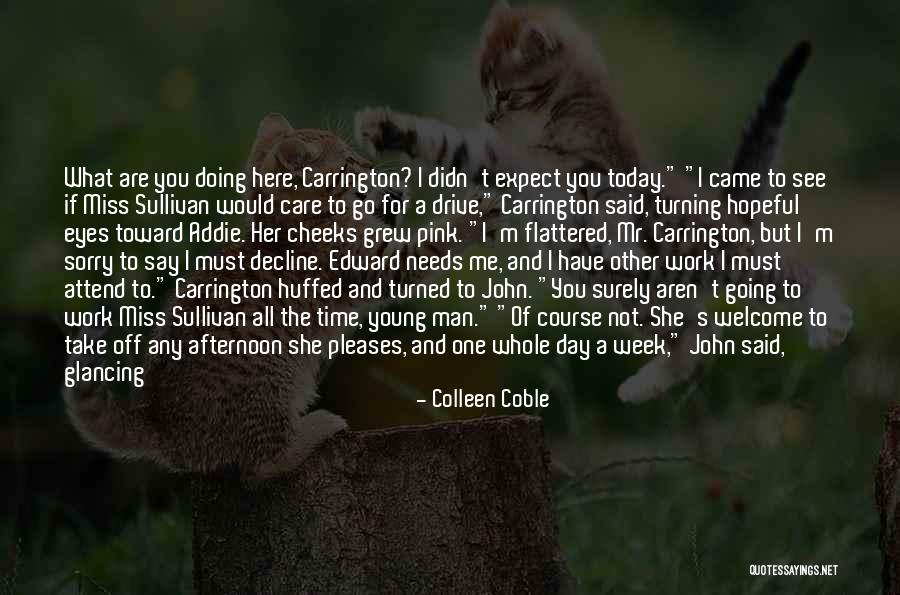
What are you doing here, Carrington? I didn't expect you today." "I came to see if Miss Sullivan would care to go for a drive," Carrington said, turning hopeful eyes toward Addie. Her cheeks grew pink. "I'm flattered, Mr. Carrington, but I'm sorry to say I must decline. Edward needs me, and I have other work I must attend to." Carrington huffed and turned to John. "You surely aren't going to work Miss Sullivan all the time, young man." "Of course not. She's welcome to take off any afternoon she pleases, and one whole day a week," John said, glancing at Addie. "Just please clear it with me, Miss Sullivan." "You're very generous," Addie said, standing. "Thank you for your offer, Lord Carrington, but I'm going to be much too busy for the next few weeks for a social life. I need to devote all my free time to Mrs. Eaton's wardrobe. Now, if you'll excuse me, I need to tend to Edward. — Colleen Coble
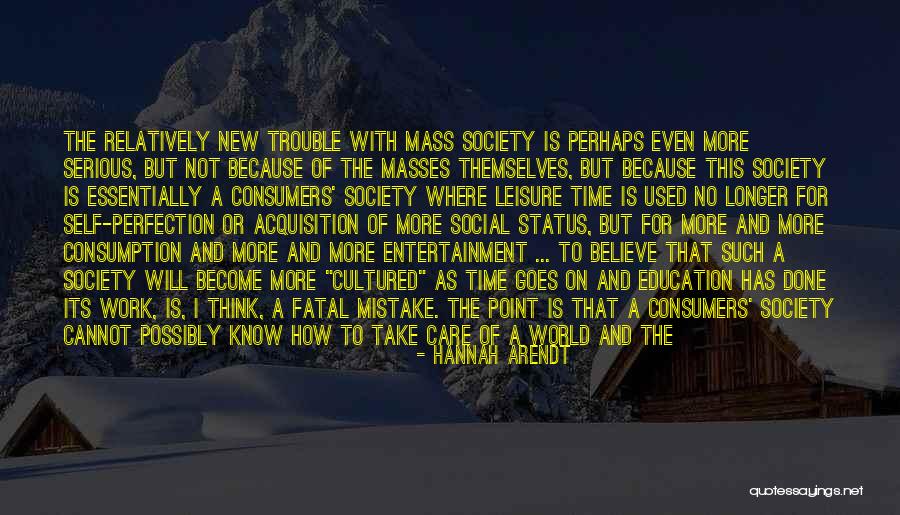
The relatively new trouble with mass society is perhaps even more serious, but not because of the masses themselves, but because this society is essentially a consumers' society where leisure time is used no longer for self-perfection or acquisition of more social status, but for more and more consumption and more and more entertainment ... To believe that such a society will become more "cultured" as time goes on and education has done its work, is, I think, a fatal mistake. The point is that a consumers' society cannot possibly know how to take care of a world and the things which belong exclusively to the space of worldly appearances, because its central attitude toward all objects, the attitude of consumption, spells ruin to everything it touches. — Hannah Arendt
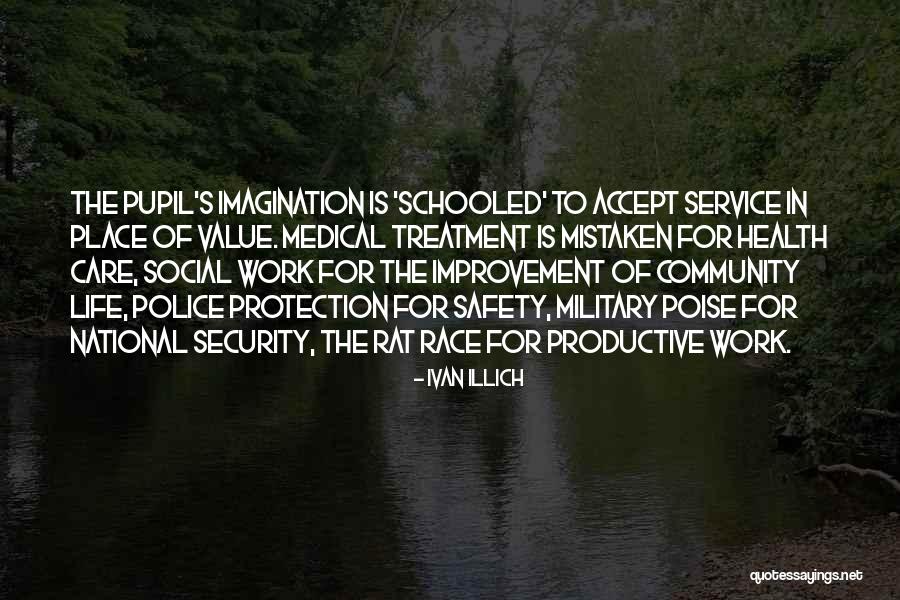
The pupil's imagination is 'schooled' to accept service in place of value. Medical treatment is mistaken for health care, social work for the improvement of community life, police protection for safety, military poise for national security, the rat race for productive work. — Ivan Illich
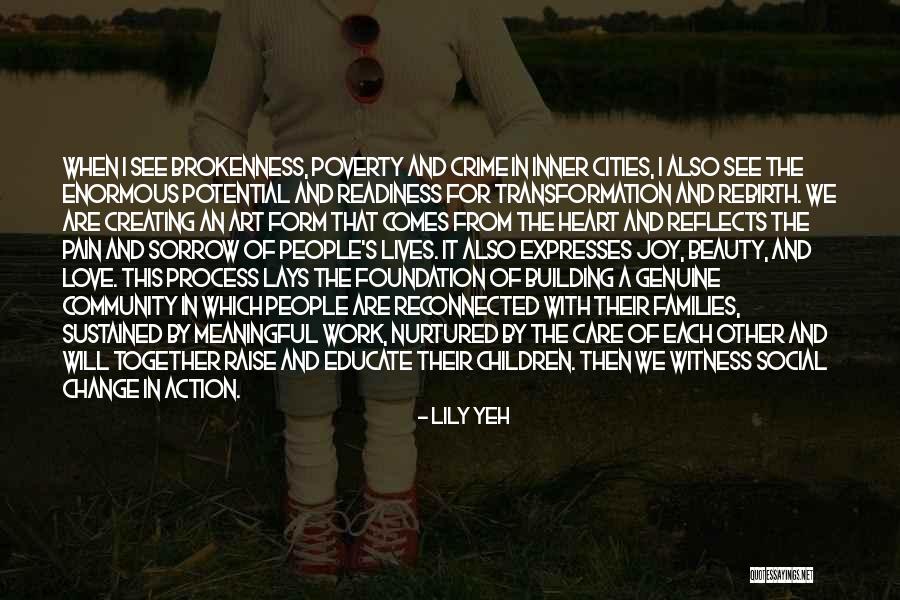
When I see brokenness, poverty and crime in inner cities, I also see the enormous potential and readiness for transformation and rebirth. We are creating an art form that comes from the heart and reflects the pain and sorrow of people's lives. It also expresses joy, beauty, and love. This process lays the foundation of building a genuine community in which people are reconnected with their families, sustained by meaningful work, nurtured by the care of each other and will together raise and educate their children. Then we witness social change in action. — Lily Yeh
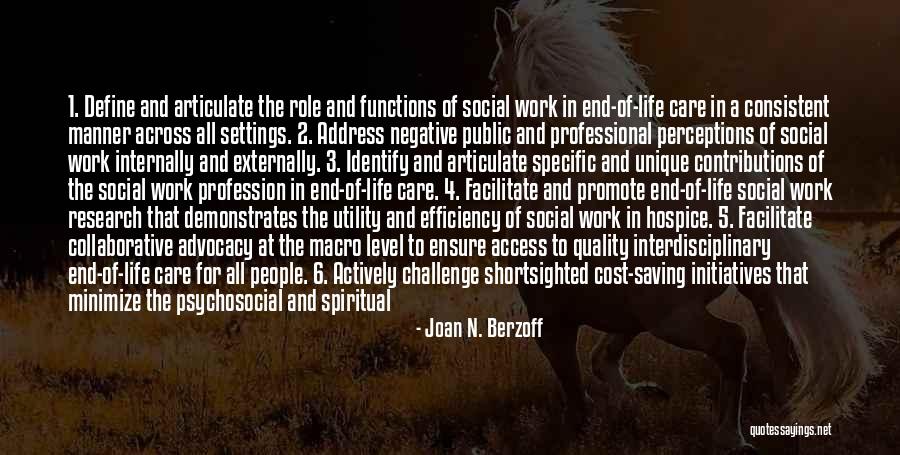
1. Define and articulate the role and functions of social work in end-of-life care in a consistent manner across all settings. 2. Address negative public and professional perceptions of social work internally and externally. 3. Identify and articulate specific and unique contributions of the social work profession in end-of-life care. 4. Facilitate and promote end-of-life social work research that demonstrates the utility and efficiency of social work in hospice. 5. Facilitate collaborative advocacy at the macro level to ensure access to quality interdisciplinary end-of-life care for all people. 6. Actively challenge shortsighted cost-saving initiatives that minimize the psychosocial and spiritual components of care for patients and families. 7. Develop standards for effective models of practice in end-of-life care. — Joan N. Berzoff
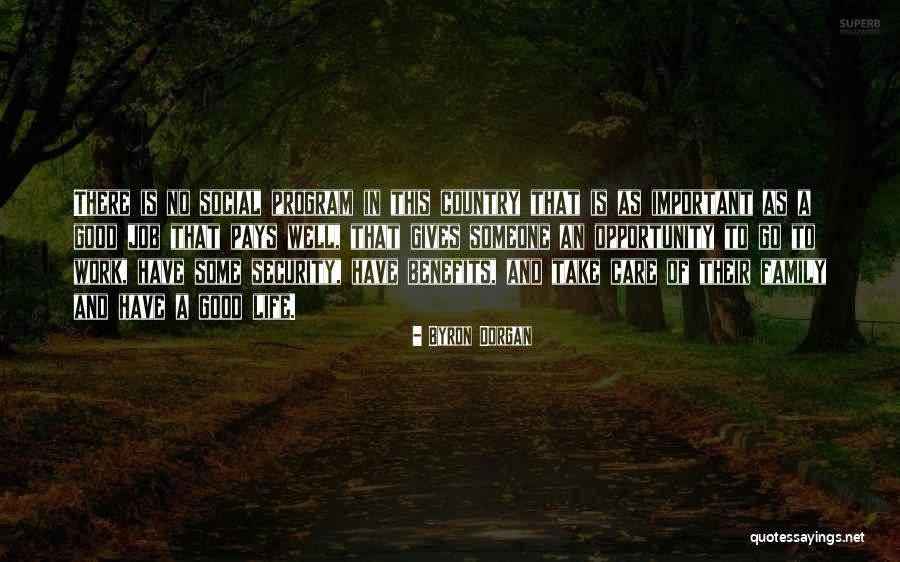
There is no social program in this country that is as important as a good job that pays well, that gives someone an opportunity to go to work, have some security, have benefits, and take care of their family and have a good life. — Byron Dorgan
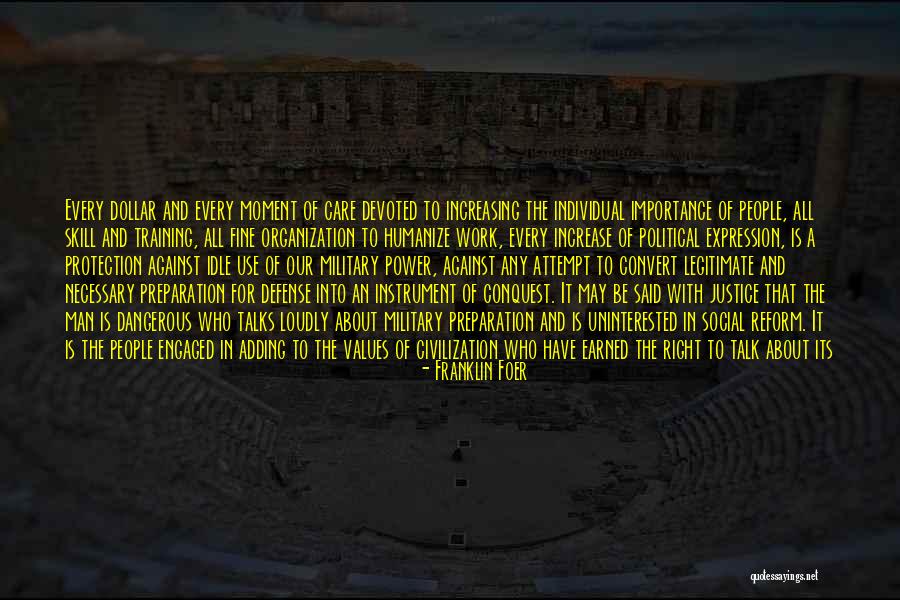
Every dollar and every moment of care devoted to increasing the individual importance of people, all skill and training, all fine organization to humanize work, every increase of political expression, is a protection against idle use of our military power, against any attempt to convert legitimate and necessary preparation for defense into an instrument of conquest. It may be said with justice that the man is dangerous who talks loudly about military preparation and is uninterested in social reform. It is the people engaged in adding to the values of civilization who have earned the right to talk about its defense. — Franklin Foer
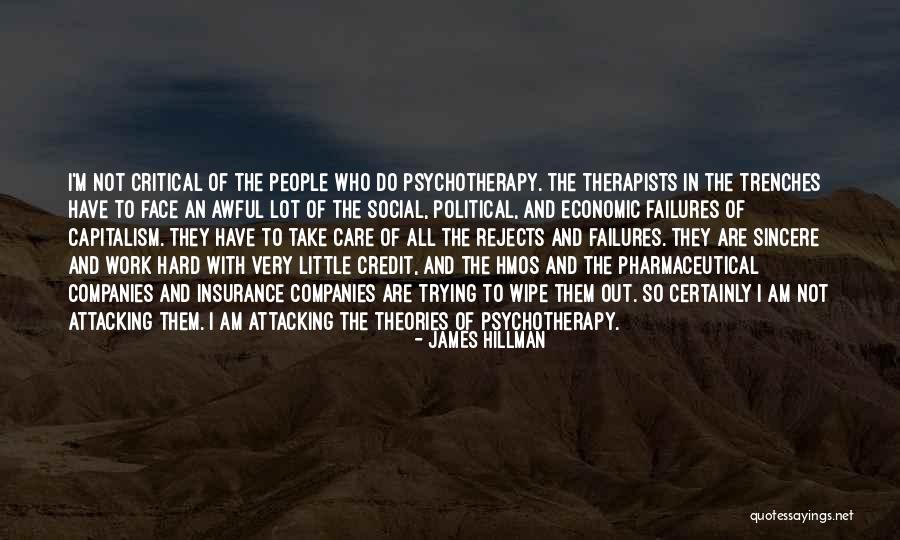
I'm not critical of the people who do psychotherapy. The therapists in the trenches have to face an awful lot of the social, political, and economic failures of capitalism. They have to take care of all the rejects and failures. They are sincere and work hard with very little credit, and the HMOs and the pharmaceutical companies and insurance companies are trying to wipe them out. So certainly I am not attacking them. I am attacking the theories of psychotherapy. — James Hillman





